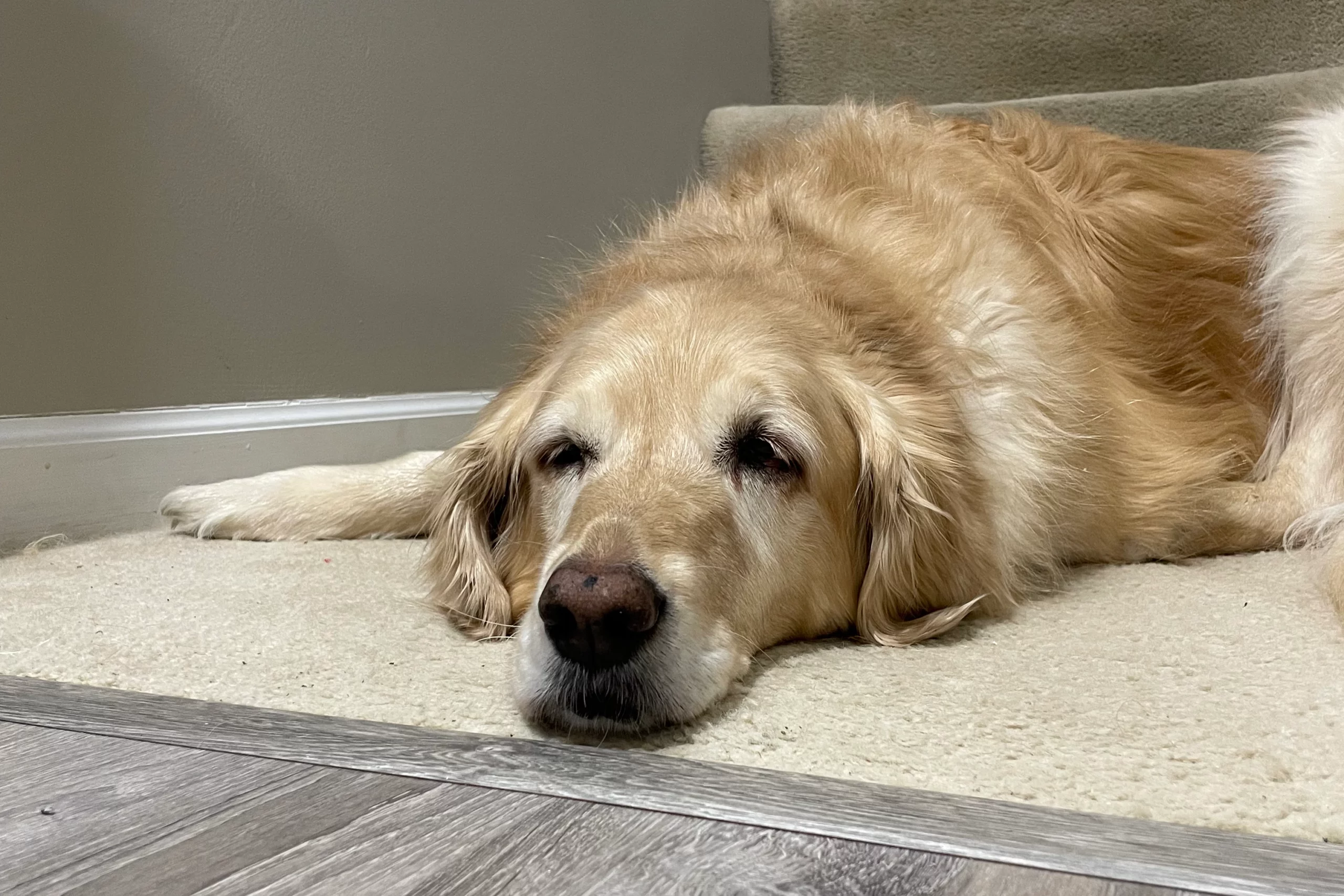Here’s a professional, engaging, and conversational introduction for the topic “do golden retrievers ever calm down?”:
—
Do golden retrievers ever calm down? If you’ve ever wondered whether those adorable bundles of energy ever settle down, you’re in for a treat! Golden retrievers are known for their boundless energy and enthusiasm, but as they grow older, they do tend to mellow out a bit.
You see, golden retrievers are like puppies in perpetual motion. They love to play, explore, and spread joy with their wagging tails. But as they mature, their energy levels start to level off, and they become more relaxed.
Now, don’t get me wrong, golden retrievers will always have a playful streak, but with time, experience, and proper training, they learn to channel their energy into more focused activities. So, while they may not calm down completely, they do become better at listening, following commands, and being content with quieter moments.
So, if you’re worried that your golden retriever will always be a whirlwind of activity, fear not! As they grow and mature, they do find ways to relax and adapt to a more calm and balanced lifestyle. It’s just another reason to love these lovable goofballs!
—

Growing Up with Golden Retrievers: Do they ever calm down?
Golden Retrievers are known for their friendly and energetic nature. They’re the perfect addition to any family, but as a responsible owner, it’s natural to wonder if these lovable pups ever calm down. Well, the answer is yes! While Golden Retrievers are generally full of energy and enthusiasm, they do mellow out as they mature. In this article, we’ll explore the various factors that contribute to a Golden Retriever’s energy levels, how they behave at different life stages, and what you can do to help them relax.
A Pup Full of Energy: The Early Years
During the puppy stage, Golden Retrievers are bursting with energy. They are curious, playful, and always ready for an adventure. This is a crucial time for their development, both physically and mentally. Puppies need plenty of exercise and mental stimulation to prevent boredom and destructive behavior. Regular walks, interactive toys, and obedience training are key to redirect their energy in a positive way.
It’s important to note that puppies have a lot of growing to do, both physically and mentally. As they age, their energy levels may seem boundless, but with proper training and socialization, you can help them channel that energy in a positive direction. Remember, a tired puppy is a well-behaved puppy!
Despite their seemingly endless energy, it’s important to start teaching your Golden Retriever proper manners and boundaries from an early age. Establishing rules and consistent training will help them understand what behaviors are acceptable and what is not. Positive reinforcement techniques, like reward-based training, work well with Retrievers and will help them learn and retain commands.
In Their Prime: The Young Adult Years
As Golden Retrievers enter their young adult years, between one to three years of age, they start to exhibit more stability and consistency in their behavior. While they still have plenty of energy, it becomes more manageable. At this stage, their training and socialization should be well-established, making them easier to handle both at home and in public settings.
During this period, you’ll notice your Golden Retriever’s playful nature and desire for interaction remain strong. Engage in regular exercise routines, such as daily walks or runs, to provide physical release and mental stimulation. Mental exercises, such as obedience training or puzzle toys, are also highly beneficial for their cognitive development and will help tire them out both mentally and physically.
It’s important to maintain a structured routine during their young adult years to help them understand boundaries. Consistency in training and reinforcing desirable behaviors will continue to shape them into well-rounded adult dogs. At this stage, they’ll become more adaptable and calmer in unfamiliar situations.
Life Settles Down: The Adult Years
As your Golden Retriever enters their adult years, around four to seven years of age, they start to reach a more balanced energy level. While they may still have bursts of energy from time to time, they become more content with a relaxed lifestyle. It’s during this phase that they truly settle down.
Adult Golden Retrievers tend to be less hyperactive and more focused. They have learned to channel their energy appropriately and have become more in tune with their owner’s cues and commands. This is the time to focus on maintaining their physical and mental well-being through regular exercise, mental stimulation, and a nutritious diet.
Despite their calmer nature, it’s important to note that they still require daily exercise and mental stimulation. Regular walks, playtime, and training sessions should remain a part of their routine. Engaging in activities that tap into their natural instincts, such as swimming or playing fetch, will provide the physical and mental stimulation they need to stay happy and healthy.
Adjusting to Senior Years: The Golden Retriever’s Golden Age
Once a Golden Retriever reaches their senior years, around eight years and older, they tend to slow down further. Their activity levels decrease, and they become more content with a quieter, more relaxed lifestyle. However, it’s important to note that individual variations exist depending on their overall health and individual characteristics.
During this stage, their exercise requirements may decrease, but still, regular walks and gentle exercises are essential to keep their joints mobile and maintain their overall well-being. Mental stimulation should continue through puzzle toys or interactive games to keep their minds sharp.
Senior Golden Retrievers require special attention to their health needs. Regular vet check-ups, a balanced diet suitable for their age, and joint supplements can help manage age-related conditions and keep them comfortable. Adjustments to their environment, such as adding ramps or orthopedic beds, can also make their everyday life easier and more comfortable.
Giving Your Golden Retriever the Best of Both Worlds
While Golden Retrievers naturally calm down as they mature, it’s essential to strike a balance between their energy needs and their need for relaxation. Regular exercise, training, and mental stimulation are crucial throughout their lives. By providing them with a structured routine, consistent training, and plenty of love and attention, you can ensure that your Golden Retriever experiences the best of both worlds – a lifetime of energy and moments of peacefulness.
Key Takeaways: Do Golden Retrievers Ever Calm Down?
- Golden Retrievers are known for their active and playful nature.
- As they grow older, Golden Retrievers tend to calm down.
- Training and proper socialization can help in calming down a Golden Retriever.
- Providing regular exercise and mental stimulation can contribute to a calmer behavior.
- Every Golden Retriever is unique, and their temperament may vary.
Frequently Asked Questions
Golden retrievers are known for their energetic nature, but do they calm down as they age? Below are some common questions people have about golden retrievers and their energy levels.
1. Are golden retrievers always energetic?
Golden retrievers are known for their boundless energy and playful nature. They are an active breed that thrives on exercise and mental stimulation. However, as they mature, they do tend to mellow out a bit. While they may remain lively, they become less hyperactive and impulsive over time.
It’s important to note that each golden retriever is unique, and some may retain their puppy-like energy throughout their lives. However, in general, golden retrievers do calm down as they enter adulthood, typically between the ages of two and three.
2. How much exercise do golden retrievers need to calm down?
To help your golden retriever calm down, regular exercise is essential. Aim for at least an hour of physical activity every day. This can include walks, runs, playtime in a secure yard, or games like fetch. Mental stimulation, such as puzzle toys or training sessions, can also help drain excess energy.
Without proper exercise and mental stimulation, golden retrievers can become bored and restless, leading to destructive behaviors. Providing them with sufficient outlets for their energy can lead to a calmer and happier dog.
3. Can training help to calm down a golden retriever?
Training is a crucial aspect of helping your golden retriever calm down. Teaching your dog basic obedience commands, such as sit, stay, and down, can help them understand boundaries and control their impulses. This can lead to a more well-behaved and less excitable dog.
Consistency and positive reinforcement are key when training a golden retriever. Use rewards and praise to encourage good behavior and discourage unwanted behaviors. Working with a professional dog trainer can also be beneficial in addressing any specific behavior issues.
4. Are there any calming techniques for golden retrievers?
There are several calming techniques that can be effective for golden retrievers. First, creating a peaceful and comfortable environment can help promote relaxation. Providing a designated cozy spot, such as a dog bed or crate, can give your golden retriever a safe space to unwind.
Calming activities, such as massage or gentle brushing, can also help relax a golden retriever. Some dogs find comfort in wearing anti-anxiety vests or listening to soothing music specifically designed for dogs. Lastly, establishing a consistent daily routine can further contribute to a calm and balanced demeanor.
5. When should I be concerned if my golden retriever is not calming down?
If your golden retriever is displaying excessive hyperactivity, anxiety, or destructive behavior despite proper exercise, training, and a calm environment, it may be worth seeking advice from a veterinarian or professional dog behaviorist. They can help assess whether there are any underlying medical issues or behavioral problems contributing to the lack of calmness.
It’s important to remember that every dog is different, and individual experiences may vary. Consulting with a professional can provide you with personalized guidance and support to ensure the well-being and happiness of your golden retriever.

Do This Every Day For A Calm Golden Retriever
Summary
Golden retrievers are energetic dogs, but they do calm down as they get older. It’s important to provide them with regular exercise and mental stimulation to help manage their energy. Training and socialization are also crucial for a well-behaved and calmer golden retriever. Understanding the breed’s tendencies and meeting their needs will help ensure a happy and calm companion.
Golden retrievers typically reach their full maturity and settle down around the age of 2 to 3 years. However, each dog is unique, and some may take longer to calm down. Patience, consistency, and positive reinforcement are key when training a golden retriever. With the right care and training, golden retrievers can become calm and loving pets for the whole family to enjoy.
